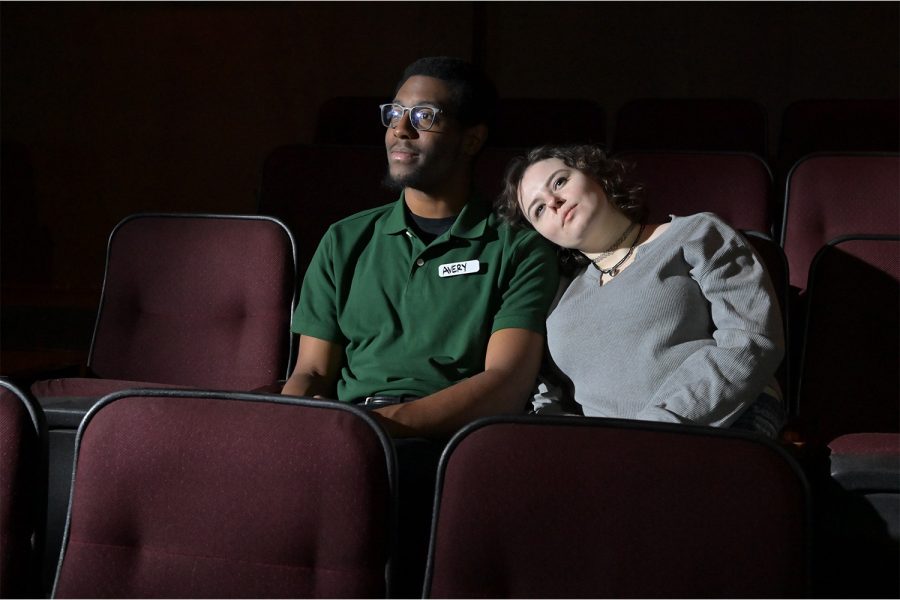‘The Flick’ to bring human connection and expression to Riverside Theatre
On Nov. 25 to Dec. 11, Riverside Theatre will present Annie Baker’s Pulitzer Prize-winning play ‘The Flick,’ which will explore how humans connect, express themselves, and cope with change.
November 29, 2022
In an age of digitization and inability to connect, an emotional tale about communication — and lack thereof — between people led to the creation of “The Flick.” Riverside Theatre will present the Pulitzer Prize-winning play from Nov. 25 to Dec. 11.
Riverside has hosted another Annie Baker production in the past called “Circle Mirror Transformation,” which was directed by Cedar Rapids Artistic Director Angie Toomsen. She was also asked by Riverside Producing Artistic Director Adam Knight to direct “The Flick.” Having directed roughly eight shows for Riverside — and as an admirer of the play — Toomsen happily accepted.
The play is set in 2013, which is the year it was written. It focuses on three characters who work at a movie theater in a small Massachusetts town. It explores each of their personal stories and life struggles, bringing together strangers who have difficulty connecting.
“At the same time, they’re each in their respective ways experiencing really large, almost operatic, desires and fears and hopes, but they each in their own way lack the capacity to articulate or express what it is they need and want,” Toomsen said.
Actor Elijah J. Jones plays Sam, a character who has worked at the movie theater most of his life. As someone in his 30s working with high schoolers, Jones explains that Sam finds his job “embarrassing,” but he cannot seem to move on.
“As the character Sam, I think the play’s so much about how we don’t take chances, and we are very stuck in what we know and what is safe, even if it’s bad for us,” Jones said.
RELATED: Riverside Theatre’s “Ghost Light” debut delivered frights and delights on Halloween night
This same idea can be applied to the show’s theme of growing digitization. The movie theater the characters work in has one of the last standard 35mm projectors in the country. Today, digital video projection has largely replaced 35mm projectors.
The show will be followed by two talkbacks. The first session will be led by Miriam Gilbert, a University of Iowa English professor of performance criticism, and the second will feature a panel of film experts.
This panel will explain the effect of digital projectors on cinema. Audiences will have a chance to further engage with the production through these talkbacks.
Along with Jones, the play will feature Ren Price as Avery, Claire Boston as Rose, and Kyle Schmidt as Skyler or “The Dreaming Man.”
Jones is an Iowa City native and a UI alum, while his castmate Price is from Louisiana. Riverside discovered Price after it conducted a nationwide search that accrued over 70 applicants for the part of Avery. This is Price’s first professional role.
Price describes Avery as a character who keeps to himself most of the time. Yet throughout the play, he reveals “glimmers” of his personality and true self that help his coworkers and the audience better understand him.
Price said the show is about how people cope with change — an especially salient idea in a world where change occurs every day.
“Stuff is always changing around us, and we don’t really know how to accept it, or we don’t know how to move with it,” Price said. “But this show, to me, it makes me feel like I’m not alone.”
Jones said the actors and the characters they play sometimes seem like inseparable identities.
“It’s something that everybody in the cast actually kind of discovered with each other — that there were weird, literal parallels with our characters each of us have, and so we kind of feel like we’re all destined to like, come together and be in this place,” Jones said.
Jones said these parallels will add to the authenticity and intimacy of the emotional — and at times heartbreaking — performances. He said he hopes audiences will feel represented by the struggles these people go through and that they will be inspired to express their emotions.
“And so, I think the best thing we can do is if an audience comes to see this and walks away going, ‘I just feel like I want to tell someone I love them,’” Jones said.



